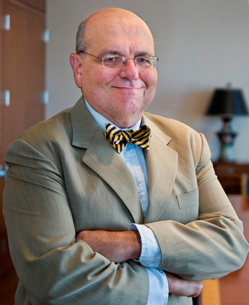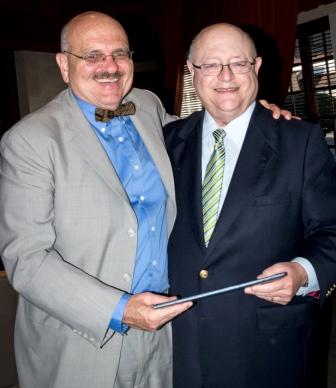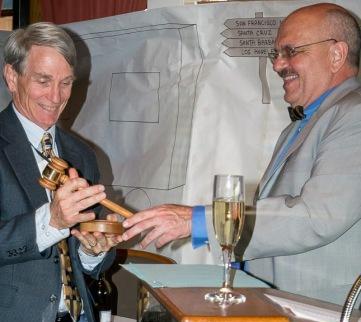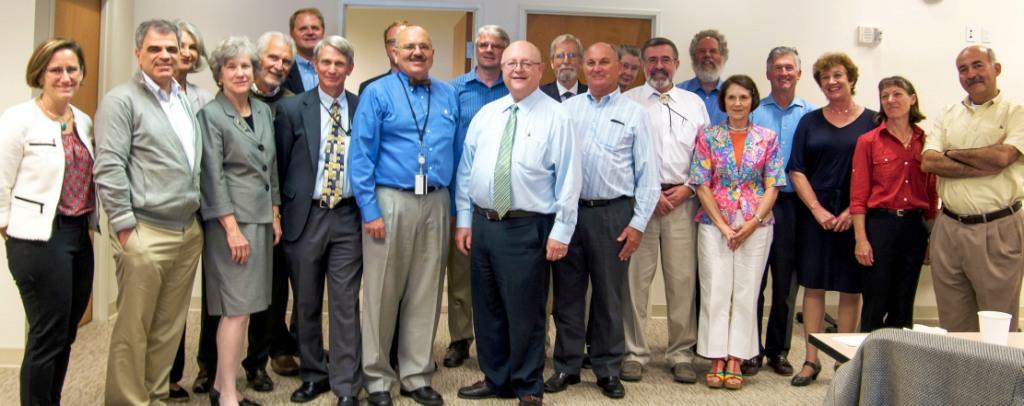August 2013

ROBERT POWELL
Dear Colleagues,
When I joined the Academic Council five years ago as chair of the Davis division, the last thing I expected was to one day carry the torch for the faculty of the greatest public university in the world as chair of the systemwide Academic Senate.
Throughout my term as chair, I have tried to use that torch to shine light on one fundamental principle – that UC’s quality depends on the University working for the good of the faculty. But what, you might ask, is the “good of the faculty”?
All year, Vice Chair Bill Jacob and I have emphasized to the Regents, UCOP administrators, and government officials that the University’s educational quality and its reputation as one of the top universities in the world derives from the quality and expertise of the faculty and an environment that values and supports faculty research and teaching. We highlighted the extent to which faculty research enhances the undergraduate experience, not only through the transmission of cutting-edge scholarship in the classroom, but also through opportunities for undergraduates to participate in the faculty’s creative or scholarly production in the field, laboratory, or studio, and in the larger community through research-based service projects. At every opportunity, we focused on the linkage between graduate education and research. We emphasized the extent to which competitive salaries and benefits attract and retain top faculty, who in turn, attract top academic graduate students, and whose research and teaching sustains a quality educational experience for both our undergraduate and graduates.
We highlighted to UC leaders how individual academic departments and the relationships they nourish preserve UC’s core excellence, and urged them to not lose sight of where excellence originates in a university — the academic program and the faculty, the faculty and the students — in their quest for high-level fiscal analyses and global metrics. With apologies to Lewis Carroll’s Cheshire Cat, I have seen outstanding departments in good universities, but I have never seen outstanding universities comprised of so-so departments.
In discussions about accountability measures for California public higher education, we stressed to policymakers UC’s long-term progress in increasing graduation rates and shortening time-to-degree. We explained that a single-minded focus on “efficiency” can work against shared goals of quality, access for underrepresented groups, and student success. We demonstrated that careful advising, judicious use of summer session, and assurance that gateway courses are available when students need to take them can help improve time-to-degree and graduation rates. We also encouraged a view of faculty workload that accounts for the faculty’s full research mission. We have hopefully dispelled the notion that faculty workload is measured by the number of courses taught rather than the number of students taught in addition to research and creative production.
 |
Chair Powell & President Yudof at the Academic Council dinner, July 24, 2013 |
I hope the Senate and administration can work together in the future to craft accountability metrics that are aligned with UC’s mission and backed by research about how the full range of factors contributes to student success. In addition, I am pleased that UCOP will update its study of faculty total remuneration using a rigorous methodology that permits longitudinal analysis. Our benchmarks against our comparator institutions will be up-to-date and will provide the basis for future salary increases.
On August 31, I end my fifth year of continuous service on the Academic Council, one of the most remarkable governance structures in higher education. Many bright, talented, and astute people have preceded me in this role, but I have discovered something that none of them ever mentioned — the Senate’s ability to influence the great debates of our time.
The Senate changed the course of public debate when Bill Jacob and I released a short letter in March outlining our opposition to Senate Bill 520 and the potential intrusion of for-profit third-party providers of Massive Open Online Courses (MOOCs) into a UC education. Our letter galvanized others who opposed the bill and was noted in national and international media reports. The Academic Council was inspired to hold its April meeting in Sacramento, where, in an amazing show of determination and unity before the State Senate Education Committee, Council members read individual statements opposing SB 520. SB 520 hasn’t gone away, but it is on hold at least until January, and it has been weakened by amendments – although not sufficient to overcome our objections.
From the outset, the media promoted the idea that just because the acronym “MOOC” contains the word “course” it meant that MOOCs reflect what we commonly recognize as a “course”: a faculty-approved compilation of knowledge and skills organized into a widely accepted, pedagogically sound system of conveying that knowledge and teaching those skills. In fact, a MOOC is only a course to those who are purveying it and trying to sell it to the public and legislators. The Senate leadership has been working closely with UCOP on a new program—the Innovative Learning Technology Initiative (ILTI)—that we believe will offer a UC-quality approach to the use of technology to provide access to a quality educational experience for our students. The Senate supports the ILTI because it is organized around a coalition of the willing. It places faculty at the center of online course and curriculum development, and requires regular-term online courses to be taught by Senate faculty and be evaluated through normal divisional Senate processes.
While I have considered it my job as Senate chair to champion the handful of immutable issues and values uniformly supported by our colleagues—educational quality, competitive total remuneration, the research mission, and shared governance—there is an even more fundamental challenge, which is to ensure that the Senate, itself, works. What do I mean by this?
The strength of the Senate is also its weakness in the sense that faculty who take Senate leadership roles have finite terms and while new leaders bring fresh ideas, departing leaders take valuable institutional knowledge with them. Just as faculty expect and demand consistency from our administration, our administration should expect consistency from us. Of course, the normal succession of vice chair to chair provides some consistency at the leadership level, but we must also be cultivating the next vice chair and the next generation of committee members and leaders to ensure the organization remains effective and consistent. Senate leaders at both the committee and divisional levels have a responsibility to consider the organization of the Senate beyond their terms in office by actively enlisting the next generation. Indeed, one of my most pleasant and challenging Senate positions was serving as a member of the Davis Committee on Committees. It may sound like dull stuff—staffing committees—but inept or inconsistent leadership is a poor alternative.
As I leave office, I see several major pieces of unfinished business that need attention. First, it is not obvious how to institutionally address the broken faculty salary scales. I am convinced that they can be reconceptualized, but that effort will require both the faculty and the administration to give up long cherished positions. We must start from two principles: the periodic pre- and post-tenure review that subjects all faculty to regular evaluation by our peers is important, and merit reviews must have meaningful financial consequences.
Second, we must curtail the rising student-faculty ratio, which is a result of decreasing numbers of faculty and an increasing number of students taking more credit hours. It is essential that we grapple with this cornerstone measure of quality in a more meaningful and visible way. It is so critical to our excellence and our future.
Finally, the Senate has asked to participate in the systemwide enrollment planning process because it directly affects educational quality and diversity, and because the Funding Streams budget model gives campuses a financial incentive to enroll nonresidents, potentially taking the place of some residents. It is critical for UC to establish an enrollment management plan that sets enforceable resident enrollment targets under rebenching and ensures that UC meets its Master Plan obligations to California residents. The Senate will continue to work in partnership with UCOP leaders to ensure these goals are met.
I have had the honor and privilege of serving on the Academic Council for nearly the identical period as Mark Yudof’s presidency. Mark has worked with the Senate on major issues facing the University and has been open to new ideas and has been respectful of faculty prerogatives. He led the University with a steady hand and a firm grip through the worst financial crisis since the Great Depression. President Yudof also deserves special thanks for his unwavering support for our position on SB 520.
I am deeply grateful to the Senate Academic Advisory Committee (AAC) who worked closely with the presidential search firm and with the Regents’ Special Committee to vet candidates to become the next UC president. AAC members who served on past presidential searches told me that this search was, without question, the best in every way. The Regents truly heard our advice. The AAC has had two meetings with president-elect Napolitano, and their excitement was palpable.
 |
Chair Powell passes the chair’s gavel to Vice Chair Bill Jacob at the July 24, 2013 Council dinner |
Although our new president has not worked in academia, she was a strong supporter of public education as governor of Arizona and has demonstrated an outstanding ability to manage complex organizations and work effectively with government officials. She is committed to listening to the faculty and to working with the Senate, and will need our help to be a successful academic leader. In keeping with her stated desire to listen and learn, the Senate leadership has prepared a briefing booklet that includes a primer on UC shared governance and a summary of the Senate’s views on a range of topics such as UCRP, total remuneration, admissions, graduate education, research, and rebenching. Please join me in welcoming President Napolitano. I wish her all the best.
I feel very good about handing the Senate chair’s gavel to my friend and colleague Bill Jacob, who will ably fill the senior role next year with Vice Chair Mary Gilly. Bill embodies UC’s core values; his blood runs gold and blue, and as a former BOARS chair and due to his longstanding involvement in K-12 math education, he understands admissions and the central role of the Master Plan in California higher education. Without question, he is the right person at the right time for the job. He is well suited to take on the challenge of orienting a new president who comes to UC from outside academia and outside California, and to articulate the faculty’s values and hopes for the future.
The longer I serve in leadership roles, the more I realize that UC’s future and the future of shared governance depend on the cornerstone values of trust and mutual respect. These are not static concepts to enshrine behind glass. They are living principles that must always frame our discussions and decisions. Unfortunately, they can also take one minute to destroy and years to regain, and if anything keeps me awake at night, it is the specter of slipping into unproductive patterns of accusation and retreat. But I am confident, based on my experience over the last six months working with the AAC and the Regents towards defining the future of the leadership of this great university, that these principles are firmly rooted. We can never take the future for granted, but as I leave my office, I believe that for many reasons, UC’s future has brightened considerably.
Fiat Lux,
Bob
 |
2012-13 Academic Council members and alternates pose with UCOP senior administrators. From L: Kit Pogliano, Farid Chehab, Linda Sarna, Aimee Dorr, Joe Konopelski, Nathan Brostrom, Bill Jacob, Peter Krapp, Bob Powell, Bruno Nachtergaele, President Yudof, Harry Green, Dan Hare, Tracy Larrabee, Jean-Bernard Minster, Robert Clare, Manuela Martins-Green, George Johnson, Christina Maslach, Peggy O’Day, and Bahram Mobasher |
